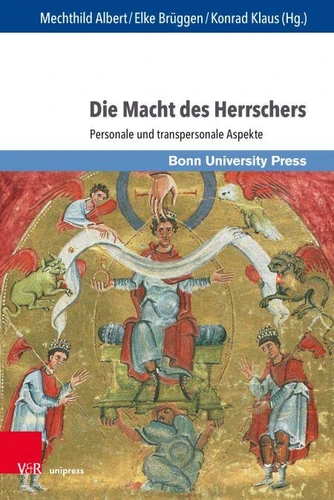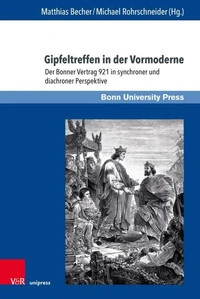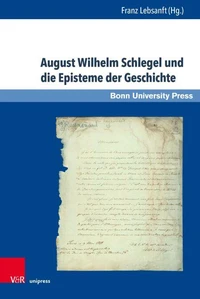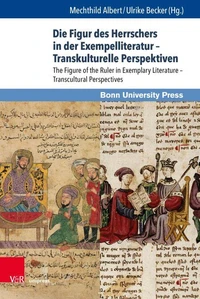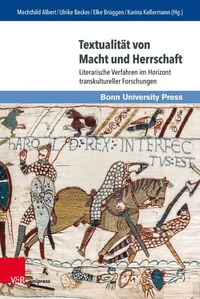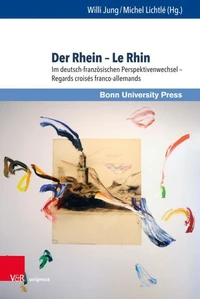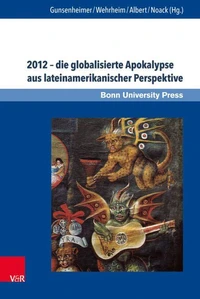Die Macht des Herrschers. Personale und transpersonale Aspekte
Par : , , , ,Formats :
Disponible dans votre compte client Decitre ou Furet du Nord dès validation de votre commande. Le format PDF est :
- Compatible avec une lecture sur My Vivlio (smartphone, tablette, ordinateur)
- Compatible avec une lecture sur liseuses Vivlio
- Pour les liseuses autres que Vivlio, vous devez utiliser le logiciel Adobe Digital Edition. Non compatible avec la lecture sur les liseuses Kindle, Remarkable et Sony
 , qui est-ce ?
, qui est-ce ?Notre partenaire de plateforme de lecture numérique où vous retrouverez l'ensemble de vos ebooks gratuitement
Pour en savoir plus sur nos ebooks, consultez notre aide en ligne ici
- Nombre de pages371
- FormatPDF
- ISBN978-3-8470-1074-6
- EAN9783847010746
- Date de parution09/12/2019
- Protection num.pas de protection
- Taille11 Mo
- Infos supplémentairespdf
- ÉditeurV&R Unipress
Résumé
Unter Aufgabe der strikten Entgegensetzung von 'Personalität' und 'Transpersonalität' von Herrschaft und des Postulats einer vorwiegend personal geprägten vormodernen Herrschaft zeigen die hier vereinten Beiträge an zahlreichen Fallbeispielen aus Asien, Ägypten und Europa das Neben- und Miteinander personaler und transpersonaler Aspekte auf. Sie fragen nach den Vorstellungen, Werten und Normen, welche die jeweiligen zeitgenössischen Leitbilder des 'guten' Herrschers bestimmten und die Grundlage für die konkrete Ausübung von Herrschaft bildeten.
Zudem richten die Beiträge das Augenmerk auf die Interaktion des Herrschers mit den Eliten, wodurch Prozesse der Konsensbildung und der Legitimierung herrscherlicher Macht, aber auch Dynamiken ihrer Infragestellung und ihres Verlustes greifbar werden. The contributions to this volume, which are based on numerous case studies from Asia, Egypt, and Europe, aim to overcome the rigorous opposition of personality and transpersonality and thus the postulate of a pre-modern rulership that has been considered to hinge almost exclusively on the ruler's person by emphasizing the coexistence and concurrency of pre-modern rulership's personal and transpersonal elements.
Moreover, they discuss the ideas, values and norms which determined the respective contemporary models of the 'good' ruler and formed the basis for the concrete exercise of rule. As a third issue, they also focus on the interaction of the ruler with the elites, whereby processes of consensus-building and legitimization of the ruler's power, as well as the dynamics of their questioning and loss, become tangible.
Zudem richten die Beiträge das Augenmerk auf die Interaktion des Herrschers mit den Eliten, wodurch Prozesse der Konsensbildung und der Legitimierung herrscherlicher Macht, aber auch Dynamiken ihrer Infragestellung und ihres Verlustes greifbar werden. The contributions to this volume, which are based on numerous case studies from Asia, Egypt, and Europe, aim to overcome the rigorous opposition of personality and transpersonality and thus the postulate of a pre-modern rulership that has been considered to hinge almost exclusively on the ruler's person by emphasizing the coexistence and concurrency of pre-modern rulership's personal and transpersonal elements.
Moreover, they discuss the ideas, values and norms which determined the respective contemporary models of the 'good' ruler and formed the basis for the concrete exercise of rule. As a third issue, they also focus on the interaction of the ruler with the elites, whereby processes of consensus-building and legitimization of the ruler's power, as well as the dynamics of their questioning and loss, become tangible.
Unter Aufgabe der strikten Entgegensetzung von 'Personalität' und 'Transpersonalität' von Herrschaft und des Postulats einer vorwiegend personal geprägten vormodernen Herrschaft zeigen die hier vereinten Beiträge an zahlreichen Fallbeispielen aus Asien, Ägypten und Europa das Neben- und Miteinander personaler und transpersonaler Aspekte auf. Sie fragen nach den Vorstellungen, Werten und Normen, welche die jeweiligen zeitgenössischen Leitbilder des 'guten' Herrschers bestimmten und die Grundlage für die konkrete Ausübung von Herrschaft bildeten.
Zudem richten die Beiträge das Augenmerk auf die Interaktion des Herrschers mit den Eliten, wodurch Prozesse der Konsensbildung und der Legitimierung herrscherlicher Macht, aber auch Dynamiken ihrer Infragestellung und ihres Verlustes greifbar werden. The contributions to this volume, which are based on numerous case studies from Asia, Egypt, and Europe, aim to overcome the rigorous opposition of personality and transpersonality and thus the postulate of a pre-modern rulership that has been considered to hinge almost exclusively on the ruler's person by emphasizing the coexistence and concurrency of pre-modern rulership's personal and transpersonal elements.
Moreover, they discuss the ideas, values and norms which determined the respective contemporary models of the 'good' ruler and formed the basis for the concrete exercise of rule. As a third issue, they also focus on the interaction of the ruler with the elites, whereby processes of consensus-building and legitimization of the ruler's power, as well as the dynamics of their questioning and loss, become tangible.
Zudem richten die Beiträge das Augenmerk auf die Interaktion des Herrschers mit den Eliten, wodurch Prozesse der Konsensbildung und der Legitimierung herrscherlicher Macht, aber auch Dynamiken ihrer Infragestellung und ihres Verlustes greifbar werden. The contributions to this volume, which are based on numerous case studies from Asia, Egypt, and Europe, aim to overcome the rigorous opposition of personality and transpersonality and thus the postulate of a pre-modern rulership that has been considered to hinge almost exclusively on the ruler's person by emphasizing the coexistence and concurrency of pre-modern rulership's personal and transpersonal elements.
Moreover, they discuss the ideas, values and norms which determined the respective contemporary models of the 'good' ruler and formed the basis for the concrete exercise of rule. As a third issue, they also focus on the interaction of the ruler with the elites, whereby processes of consensus-building and legitimization of the ruler's power, as well as the dynamics of their questioning and loss, become tangible.

